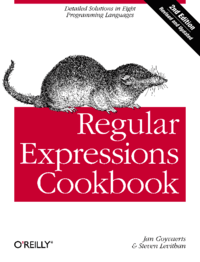Etiqueta "regular expressions"
Se han encontrado 2 Coincidencias
Regular Expressions Cookbook, Second Edition
Regular Expressions
172 Visitas | 168 Descargas | 2013-10-03 20:07:45 | ybpadron
We particularly wanted to show how you can use regular expressions in situations where people with limited regular expression experience would say it can’t be done, or where software purists would say a regular expression isn’t the right tool for the job. Because regular expressions are everywhere these days, they are often a readily available tool that can be used by end users, without the need to involve a team of programmers. Even programmers can often save time by using a few regular expressions for information retrieval and alteration tasks that would take hours or days to code in procedural code, or that would otherwise require a third-party library that needs prior review and management approval.

Regular Expressions: The Complete Tutorial
Expresiones regulares
227 Visitas | 166 Descargas | 2016-09-13 16:44:52 | josedaniel
There are many software applications and programming languages that support regular expressions. If you are a programmer, you can save yourself lots of time and effort. You can often accomplish with a single regular expression in one or a few lines of code what would otherwise take dozens or hundreds. If you are not a programmer, you use regular expressions in many situations just as well. They will make finding information a lot easier. You can use them in powerful search and replace operations to quickly make changes across large numbers of files. A simple example is «gr[ae]y» which will find both spellings of the word grey in one operation, instead of two. There are many text editors and search and replace tools with decent regex support. This tutorial is quite unique because it not only explains the regex syntax, but also describes in detail how the regex engine actually goes about its work. You will learn quite a lot, even if you have already been using regular expressions for some time. This will help you to understand quickly why a particular regex does not do what you initially expected, saving you lots of guesswork and head scratching when writing more complex regexes.
Contribuir
Usted puede contribuir con Libros UCLV, es importante para nosotros su aporte..
Contribuir